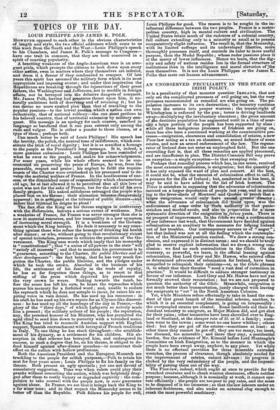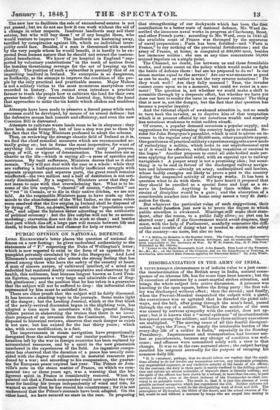AN UNOBSERVED PECULIARITY IN THE STATE OF IRISH POLICY.
IT is a peculiarity of that monster question IRELAND, that not only are the complicated processes of evil going on, but the very processes recommended as remedial are also going on. The po- pulation increases to its own destruction; the tenantry continue to turn the estates into pauper warrens ; the tenant-right of Whiteboyism is enforced by the gun ; terror is driving landlords away—multiplying the involuntary absentees ; the gross amount of fhe destitute population has augmented until in a time of scar- city a large portion of the people has been supported by alms : while all these indigenous processes of Irishism are going on, there has also been a continued working at the counteractive pro- cesses—emigration, clearances and consolidation of estates, a new Poor-law acting as a tax on absentees, an armed defence of some estates, and now an armed enforcement of the law. The regene- rator of Ireland does not enter an unploughed field. But the one overriding fact is, that all these remedies are applied piecemeal, and are insufficient in plan. The District Coercion Bill may prove an exception—a single exception—to that sweeping rule. • Perhaps that remedial process which has, in one sense, received the most extensive application, is emigration; but the quantity of it has only exposed the want of plan and concert. At the best, it could not be, whist the enemies of colonization affect to call it, a panacea for the ins of Ireland ; but, conducted as it has been, it may be said to have added to the list of Irish horrors. The Times is mistaken in supposing that the advocates of colonization insisted on a larger deportation of people last year, and in point- ing to the fever-sheds of Montreal and Quebec as proofs that a larger emigration- would only have caused greater disaster ; what the advocates of colonization did insist upon, was the enforcement of some order by State authority in that panic- stricken and morbid wide, and also on preparation, for a more systematic direction of the emigration in future years. There is no prospect of improvement. In the Globe we read a confirmation of our inference last week, that Government have decided against colonization as an auxiliary to the measures for helping Ireland out of her troubles. Our contemporary accuses us of anger"; but that indeed was not at all the feeling which the contempla- tion of the Ministerial position excited. We drew a strong con- elusion, and expressed it in distinct terms; and we should be truly glad to receive explicit information that we drewia wrong con- clusion: we find no such contradiction in the Globe. On the contrary, so powerful, we learn, is the official leaning against colonization, that Lord Grey and Mr. Hawes, who entered office as determined advocates of colonization for Ireland, have been compelled to relinquish their opinions—or, as the Globe phrases it, to admit that their theories need a vast deal of correction in practice." It would be difficult to adduce stronger testimony in favour of our inference. Lord Grey and Mr. Hawes have not yet formally avowed their recantation but we are not prepared to question the authority of the Globe. Meanwhile, emigration is not much better than transportation, justly charged with leaving the emigrants to " rot " in the North American Colonies.
Yet, while Ministers refuse effectually to take in hand the con- duct of that great branch of the remedial scheme, another, to which it is an essential complement, is going on irrepressibly : the overpeopled estates are cleared. Some landlords aid their re- dundant tenantry to emigrate, as Major Mahon did, and get shot for their pains • other, tenantries have been shovelled over to Eng- land or Scotland, at the cheaper rate of 3/. or 5/. a family; num- bers went to the towns ; some went no one knew whither ; others died : but they are got off the estates—sometimes at least : at other times they cannot be got off; they are too many, too inert, too diseased, too miserable; - and there they stay, a pestilential burden. See the evidence of Mr. Kincaid before Lord Monteagle's Committee on Irish Emigration, as to the manner in which the people have been swept away, anyhow, to any place. Yet while there is no effectual provision for these miserable extruded wretches, the process of clearance, though absolutely needed for the improvement of estates, cannot advance : its progress is choked by the very redundancy of the people, and the impossi- bility of putting them out of the way. The Poor-law, indeed, which ought at once to provide for the wretched creatures and to check wanton clearances, effects neither purpose; because, although it is nominally at work, it cannot ope- rate efficiently : the people are too poor to pay rates, and the mass i to be disposed of is too immense; so that the law labours under an inherent feebleness, and also under an external clog enough to crush the most powerful machinery. The new law to facilitate the sale of encumbered estates is not yet passed; but we do not see how it can work without the aid of a change in other respects. Insolvent landlords may sell their estates, but who will buy them ? or if any bought them, who would venture to improve ? The landlords are hastening away, terrified by conspiracies against life, which no individual intre- pidity could face. Besides, if a man is threatened with murder by the very people whom be would benefit, it is hardly to be ex- pected from human nature that he should not retract the contem- plated benefaction. We know of no hospital in England "sup- ported by voluntary contributions" in the teeth of notices from the inmates threatening revenge for the act of keeping up the charity. The position of such a subscriber is precisely that of an improving landlord in Ireland. No enterprise is so dangerous, so foolhardy, as the attempt to improve the condition of the peo- ple by the only practical and practicable means. Major Mahon is not a solitary victim to the most monstrous martyrdom ever recorded in history. You cannot even introduce a practical farmer to teach the people how to cultivate the land for their own greater benefit: they resemble the hunted dog, biting the hand that approaches to untie the tin kettle which chokes and maddens him.
Attempts have been made to preserve a forced peace while such processes could be developed, by means of an armed defence: but the defensive means lack concert and efficiency, and even the new Coercion Bill is distrusted.
Attempts to cultivate waste lands seem to be in abeyance: they have been made formerly, but of late a stop was put to them by the fact that the Whig Ministers professed to adopt the scheme. Thus on reviewing the strange chaotic field of Ireland as it is, we find the chief remedial measures which are recommended ac- tually going on; but in forms the most inoperative, for want of anything like combination, comprehensive unity of purpose, grasp of will, or vigour of determination. The remedies are as chaotic as the ills—which is saying all—a mass of specifics and nostrums. By tacit sufferance, Ministers decree that so it shall remain. They will not deal with the case as a whole : while they are suffering a half-spontaneous wholly inefficient struggle with separate symptoms and separate parts, the great result remains unaffected—the two million and a half of destitution is not seri- ously diminished. By a negative, Ministers avow that they do not mean to cope with that overwhelming fact. What is to be- come of the live surplus, "cleared" off estates, " shovelled " out to "rot" in Canada, or to die in their native ditches, we are not told. As the responsible Ministers teem to have made up their minds to the abandonment of the West Indies, so the same rulers seem resolved that the live surplus in Ireland shall be disposed of by dyingoff. That, no doubt, would settle the "population ques- tion, and adjust the balance better according to the arithmetic of political economy : but the live surplus will not be so accom- modating; starvation does not do. its work so clean and besides that part which dies off, a large part will remain betiveen life and death, to burden the land and clamour for help or removal.































 Previous page
Previous page